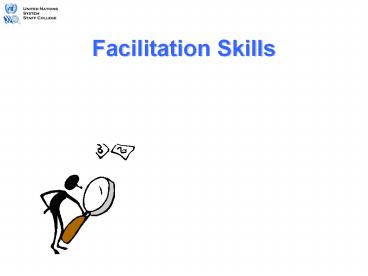Facilitation Skills - PowerPoint PPT Presentation
Title:
Facilitation Skills
Description:
by using a range of skills and methods. to bring the best out in people as they ... that language is a barrier and make allowances without being patronising ... – PowerPoint PPT presentation
Number of Views:4633
Avg rating:3.0/5.0
Title: Facilitation Skills
1
Facilitation Skills
2
What is a facilitator?
- Literally means making things easy
- A person who helps a group or team to
- achieve results in interactive events
- by using a range of skills and methods
- to bring the best out in people as they work
together - focuses on the process of how
3
What a facilitator is NOT
- participant in the team
- team leader
- team organiser/administrator,
- negotiator on the teams behalf,
- servant who simply does the bidding of the team
- expert trainer
4
Role Conductor
5
Role Impartial Helper
- belonging to no political coalition within an
organisation - being seen as having no stake in the outcomes
6
Facilitators Role Overview
- cope with uncertainty
- use power of credibility to help address issues
- be calm in times of emotion
- support and counsel others
- be understandable
- mobilise energy
- surface difficult issues and help others to do so
- take themselves less seriously
- empathise
7
Group processesintervening
- model appropriate behaviour
- ensure involvement
- enable understanding
- keep a task-related focus
- push for action outcomes
- manage time
- ensure that a record is created
8
Interpersonal Skills/Basic Facilitation Skills
- listening
- questioning
- language
- communication
-
using -
feedback - conflict handling
9
Ten Commandments of Effective Listening
- 1. Stop talking
- 2. Put your people at ease
- 3. Show you want to listen
- 4. Remove distractions
- 5. Empathise
- 6. Have patience
- 7. Hold your temper
- 8. Dont argue or
- criticise
- 9. Ask questions
- 10. STOP TALKING
10
Questioning
- Use O P E N to probe
- Who, why, what, when, how?
- Use CLOSED (yes/no answers)
- to redirect/ summarise
- Are you saying that?
11
Questioning
- Use YOU questions
- How do you see this?
- What are your priorities?
- How important is ...... to you?
- Tell me more about ......?
- What if.......Why........How......?
12
Using Feedback
- Help participants to think through
- these questions
- 1. What did you do well?
- 2. What could you have done
- even better?
- 3. What prevented you from doing
- even better whats the plan to
- do even better in the future?
13
Conflict Handling
- identify points of agreement
- reformulate contributions to highlight common
ideas - encourage people to build on others ideas
- test for false consensus
- test consensus for relevance/motivation
14
The Facilitraining Rainbow
- 1. How much interaction does the facilitator
have with participants? - 2. How much does the facilitator contribute to
the content/outcome of the session?
15
The Facilitraining Rainbow
Socratic direction
HIGH
facilitating discussion
I n t e r a c t I o n
teaching
demonstrating
brainstorming
process monitoring
presenting
Contribution to Content
HIGH
LOW
16
Cross-Cultural Dynamics
- Variable language skills
- Recognition of cultural differences without
reinforcing stereotypes - Different cultural norms about politeness and
communication style ie interruption
argumentativeness - Awareness of perceived status differences between
cultures - Loyalty towards ones own cultural group
17
Code of Cross-Cultural Conduct
- We appreciate enjoy cultural diversity
- We accept that our own perceptions are coloured
by our own upbringing/culture - We empathise with others view
- We are open-minded and we dont stereotype other
nationals - We openly discuss how our different cultural
backgrounds may be influencing an issue
18
Code of Cross-Cultural Conduct
- We recognise and accept that physical contact
differs across cultures - We recognise that language is a barrier and make
allowances without being patronising - We always double-check understanding
- We plan our communication to eliminate the
negative and accentuate the positive - We communicate in a clear, direct, honest and
open way
19
Helpful Attitudes Values
- My mind-set wont help them
- Everybody is human, unique with potential
- Its OK to teach
- No one best way
- People never argue with their own data
- Facilitators cant win arguments
- Silence is OK
- Dont push the river
20
Good Facilitation Brings
- Co-operation
- Results































